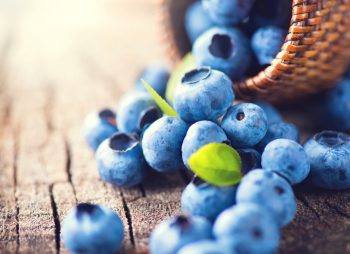By Marianna Pochelli, N.D.
Guest writer for Wake Up World
An acute dose of blueberries (300 grams) is associated with an 18% decrease in DNA damage to blood cells due to oxidative stress, according to findings published in the journal Nutrition Research.
Blueberry consumption has previously been linked to reduced risk of Alzheimer’s and cardiovascular disease, and the beneficial effects of the blueberries are thought to be linked to their flavonoid content. The exact way in which flavonoids affect the brain are unknown, but they have previously been shown to cross the blood brain barrier after dietary intake. It is believed that they may exert their effects on learning and memory by enhancing existing neuronal connections, improving cellular communications and stimulating neuronal regeneration. Previous data suggests that wild blueberries may also reduce oxidative damage to DNA and decrease the risk of cardiovascular and degenerative diseases.
[pro_ad_display_adzone id=”110027″]
A study appearing in ACS’ Journal of Agricultural and Food Chemistry found that that although there are over 600 species of blueberries and blueberry-like fruits growing in Mexico, Central and South America, two types of neotropical blueberries were extreme super fruits — they had significantly more antioxidants than a type of blueberry commonly sold in U.S. supermarkets stores. The researchers say that these neotropical blueberries “have the potential to be even more highly promising edible fruits.”
Consumer interest in blueberries and the compounds they contain has increased in recent years, following results from studies reporting a wide range of health benefits, most notably for brain health and reducing the risk of Alzheimer’s. These effects are believed to be derived from the flavonoids anthocyanins and flavanols.
“The protection against oxidative stress may be related to other bioactives absorbed, apart from anthocyanins (eg, phenolic acids, vitamin C), acting alone or synergistically,” wrote the researchers, led by Patrizia Riso from the University of Milan. “Moreover, these compounds could have indirectly activated signaling mechanisms of defense (eg, antioxidant enzymes through gene expression modulation) even though the effect is not maintained at 2 hours.”
Study Details: 300 Grams Decreases DNA Damage
The Milan-based scientists recruited ten young volunteers to participate in their randomized cross-over trial. The participants were asked to consume either 300 grams of ground blueberries or one portion of a control jelly.
Blood samples were taken before and 1, 2 and 24 hours after ingestion, and used to test for H2O2-induced DNA damage, anthocyanin absorption, and NO levels. Arterial function was also measured.
Results showed that one hour after consuming the ground blueberries H2O2-induced DNA damage was reduced by 18%, compared to control. The effects were transient, however, and no effects were observed 2 and 24 hours after consumption, said the researchers.
No effects were observed on arterial function and nitric oxide levels, they added.
“Our results suggest that blueberries did not produce any short-term protective effects in healthy subjects with uncompromised vascular function but we cannot exclude that improvements in the vascular function occur at later time points than 1 hour after a single [serving of blueberries]. In addition, regular blueberry intake may protect against the development of vascular dysfunction in patients with cardiovascular risk factors.”
Advisory: Based on the 2009 US Department of Agriculture (USDA) Pesticide Data Program, 120,797 tests found 46 different pesticide residues on conventional blueberries. The good news is 17 out of those 46 pesticides were only found on less than one percent of all the blueberries tested. Another 14 of the 46 were found in less than nine percent of all blueberries tested, which means that 31 of the 46 pesticides that were found most likely drifted from other agricultural areas. The other piece of good news that I found in this hunt was that frozen blueberries had less than half the number of insecticides present as the fresh berries. The Bottom Line is to make every attempt to buy organic blueberries, but it’s not an absolute necessity if they’re not available.
Sources:
Also by Marianna Pochelli :
- This Is What Happens To Your Brain Cells When You Experience Happiness
- 5 Ways Happiness Affects Your Cellular Structure
- 15 Facts Most People Don’t Know About Fluoride
- Amazing Plant Kills Malignant Tumors and Destroys 70% of Breast Cancer Cells
- Maximizing Nutrition and Elimination of Heavy Metals Comes From Blending, Not Juicing
- Alzheimer’s, Parkinson’s, Multiple Sclerosis, Depression & Bipolar Disorder All Linked to Metal Toxicants
About the author:
Marianna Pochelli ND is a Doctor of Naturopathic Medicine specializing in the treatment of disease through super-foods and herbal strategies. She actively promotes detoxification, colon cleansing, and a vegetarian lifestyle using living foods as a platform to good health. You can follow Marianna at preventdisease.com, where this article first appeared.
[pro_ad_display_adzone id=”110027″]







